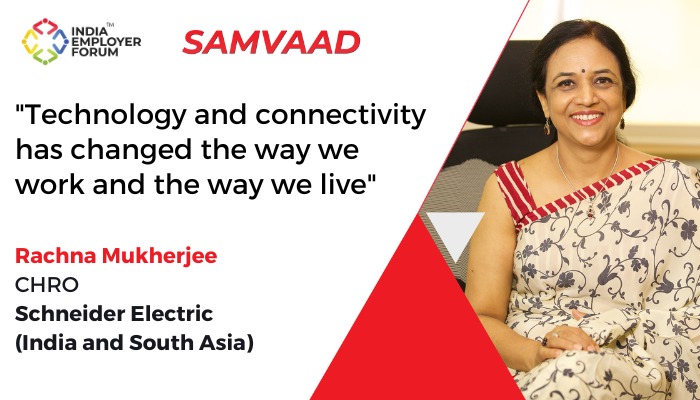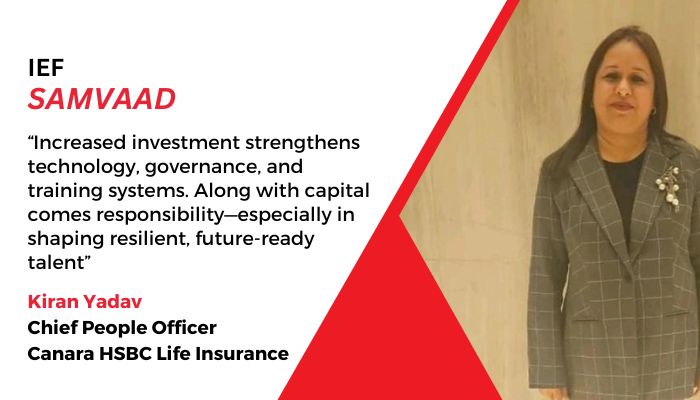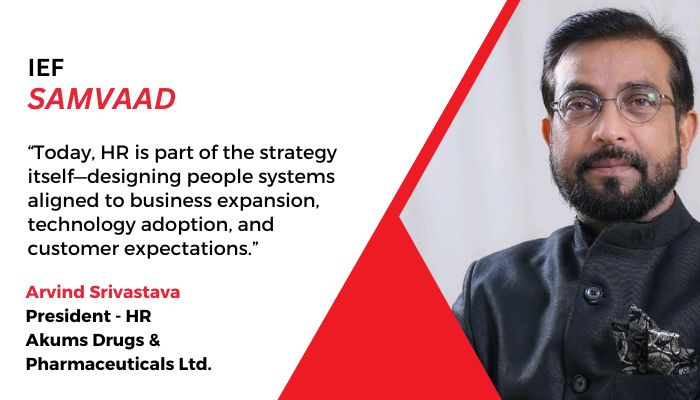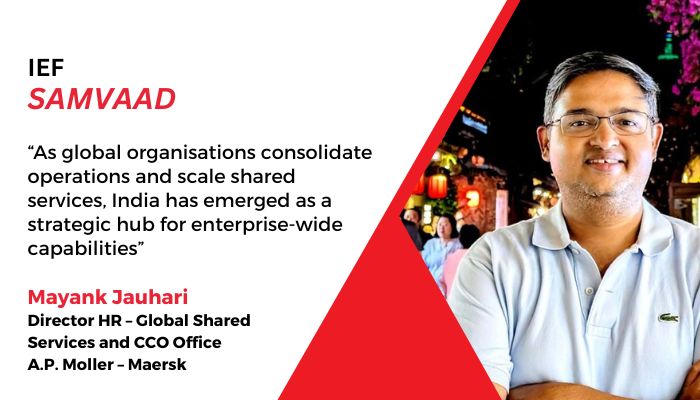Rachna Mukherjee, CHRO, Schneider Electric – India & South Asia speaks to India Employer Forum about workforce engagement, DE&I, employee wellbeing, and the changing world of work.
Q. Tell us about your illustrious professional journey?
I started my journey with a degree in electrical and electronics engineering from BITS Pilani. I worked in technical roles for almost a decade before I moved into HR. Right now, I’m the CHRO for Schneider Electric for India and South East Asia. Before that, I have been the HR leader for Aircel Limited. I have also worked with Microsoft, IBM, Escotel, NIC and Bluestar.
In my free time, I love interacting with people. So, spending time with my friends, family and colleagues becomes an important part of what I do. I love gardening and I also love sports like badminton, table tennis and swimming. I do some bit of reading and painting in the middle of all this.
Q. What shifts are employers making to engage the workforce of the future?
Engaging the workforce of the future is extremely crucial. Over the past years, there are some mega trends which are shaping the world. There’s a huge acceleration in the adoption of digital. Technology and connectivity has changed the way we work and the way we live. This has happened over many years and in the last two years, it has probably accelerated even more. The sense of urgency around climate change has intensified. So, organisations are making it a more serious agenda for themselves. New ways of organising the workforce have emerged. Because there is digital and remote working, there are workforces which are diverse, which want to engage in different ways and there are some like open talent ecosystems.
Let’s look at the emergence of the workforce and workplace of the future and understand how it seems today. Many organisations would like to work with network teams. So, there are these permanent employees, but for certain actions and objectives, they’d want to get people together from different roles to give a part of their time. It is like a plug-and-play approach for delivery of that result. Apart from this, there would be core groups, so there are definitely groups of high potential, high performing employees but also organisations are opening up to the idea of borrowing talent where and when needed. There’s also this concept of gig contracts, external gig and internal gig workers for certain niche skills. Hence, executives need to look at creative ways in which this can be done and all the workforce can be brought together.
Q. What are your thoughts on DE&I? How has been your experience in leading HR for an inclusive organisation like Schneider Electric?
This is one of my areas of great passion. So, let me begin by saying that DE&I today is a business imperative for any organisation. I know there is a lot of online research on it, and all this research confirms that business results improve if we have a more diverse workforce. It improves, because policies become more balanced when made from all perspectives and made by different prospective holders. Our customers are both men and women, young and old from every walk of life. So, if we need to handle the needs of the customer having all those perspectives, insight becomes very important. We know that all this brings higher creativity and innovation, and it is not a great idea to miss more of the talent pool which comes from other diverse segments. All this ends up adding to higher performance for the organisation.
Now, I think it is just not enough to hire these diverse people, but it is equally important to include them in what you’re doing, and that’s why diversity and inclusion becomes very important. So, treating all the communities with respect and fairness, valuing their uniqueness, and sense of belonging, that is what inclusive leaders would do. Inclusive leadership actually becomes the Hallmark of a diverse and inclusive workplace. Now, in leading an organisation like Schneider, I would say we really worked very hard on this aspect of diversity, equity and inclusion, and it’s also been a very fulfilling journey because we completely believe at a philosophical level in equal opportunities to everyone everywhere.
Q. Being awarded SHRM for wellbeing, would you like to share about your holistic wellness approach?
We were called out as a winner for health and wellbeing by SHRM and I would like to just say that health and wellbeing has not been an agenda for Schneider Electric in the phase of this pandemic. We started way back in 2015, focusing very strongly on wellness of employees and health, and wellbeing has been a strong agenda for us since then. What we followed was a 4-pronged approach, but there is a fifth interesting aspect to it. While physical wellbeing, mental wellbeing, emotional wellbeing and social wellbeing were key, we also had this component of financial wellbeing which cuts across all of this. So, for us at a concept level, we think it is connected to the care of our employees which is very important for us. It is also a philosophy of “wellbeing is performance and performance is wellbeing.” So it is all very, very connected for all of us. These are things that we’ve been doing in terms of certain innovative practices which may help us go in the direction of such recognition but more importantly as a business strategy.
So, I talked about flexibility at work and new ways of working with this new workplace environment. Flexibility is something that helps people take care of their personal life, take care of their professional life, and hence, it provides them with a certain kind of fulfilment, certain kind of balance which is very important, and we have been driving this very strongly recently.
Around two years back, we had an official playbook created for it and then we ran boot camps for our leaders and managers around it. We have a global family leave policy, wherein, instead of just giving sick leaves, we give care leaves to people to take care of their families when there is an issue of health of any kind for anyone.
Q. If you have to sum up your journey in one learning, what will be your closing statement for our audience?
For me, personally the attributes which stand out are aiming high, because I feel that if you aim for the moon you may hit the stars at least. Building your courage and conviction and then pushing yourself, stretching the boundaries and pushing yourself outside the comfort zone is important, these are some of the things, self-belief, passion and pride are some of the things that I would definitely call out as my learnings.
I can’t say the same for everybody because everybody is different. From a professional journey perspective, staying abreast of the trends, I think the workforce of the future is the next game changer. As an HR fraternity, as a business fraternity, and as organisations, are we ready to embrace it? This is something that I would call out as one of the many areas to look at, but being abreast of the trends ushering in progressive practices which really means challenging the status quo, challenging the current culture and current mindset is really what I have tried to do and what I think would be needed in the workplace as we move forward.
Watch the full interview: In Conversation with Rachna Mukherjee | CHRO | Schneider Electric, India & South Asia
About Rachna Mukherjee
Rachna Mukherjee is the Chief Human Resources Officer of Schneider Electric, India and South Asia. She has over 35 years of experience in Business and HR across diverse industries and has significantly contributed to cultural and strategic people transformation agenda in organisations. She serves as a Director on the Boards of several group companies. She believes that the right balance of IQ, EQ & SQ, authentic and inspirational team leadership, strategic influencing, and a growth mindset is critical to success in the corporate world, especially in the context of a disruptive global environment. Prior to joining Schneider Electric, she was Vice President HR at Aircel Ltd.
Rachna has played key strategic roles in diverse organisations such as Microsoft, IBM, Escotel Mobile Communications, NIC, and Blue Star – Hewlett Packard. Her areas of expertise include: Change management | Talent Management | Succession Planning | Organisation Capability | Leadership Development | Employee Engagement | Compensation and Organisation Design | Employer Branding. Furthermore, Rachna is a certified Executive and Life Coach from International Coach Federation and is certified to conduct a series of leadership and employee development interventions. She is an Electronics & Electrical Engineer from BITS – Pilani, and after her contribution to Engineering roles, she moved to Human Resources.






